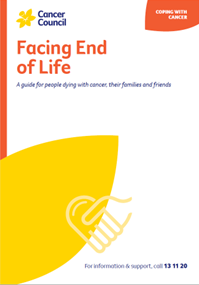- Home
- About Cancer
- Advanced cancer
- Facing end of life
- Common questions about dying
- How will I know that the end is near?
How will I know that the end is near?
For many, dying is a process that happens gradually. As the physical body slowly shuts down, energy and concentration levels vary and there are good days along with days when you can’t do much at all. Your appetite will reduce, and sips of water or a teaspoon of food here and there may be enough.
As death gets closer, it’s common to have little interest in talking and the outside world. You may find your attention withdraws from family and friends, and you may sleep more and more throughout the day and night.
Near the end, some people may need pain relief or other medicine to keep them comfortable, which may have a sedative effect. Many people slip into unconsciousness before dying, although some remain alert almost until the end. Others may have periods of being awake, and then slip back into unconsciousness.
No-one knows how a dying person experiences the moment of death. Whatever happens, in many cultures it is thought to be a peaceful moment. There is often a couple of deep breaths or sighs before the final breath, when breathing stops.
For more on the dying process, see Caring for someone nearing the end of life. This information may be confronting, so consider if this is the right time to read it.
→ READ MORE: What if I feel distressed?
Podcast: Living with Dying
Listen to more episodes of our podcast for people affected by cancer
More resources
Prof Jane Phillips, Head, School of Nursing and Professor, Centre for Healthcare Transformation, Queensland University of Technology and Emerita Professor Palliative Nursing, University of Technology Sydney, NSW; Prof Meera Agar, Palliative Care Physician, Professor of Palliative Medicine, University of Technology Sydney, IMPACCT, Sydney, NSW; Sandra Anderson, Consumer; A/Prof Megan Best, The University of Notre Dame Australia and The University of Sydney, NSW; Prof Lauren Breen, Psychologist and Discipline Lead, Psychology, Curtin University, WA; David Dawes, Manager, Spiritual Care Department, Peter MacCallum Cancer Centre, VIC; Rob Ferguson, Consumer; Gabrielle Gawne-Kelnar, Counsellor, Psychotherapist and Social Worker, One Life Counselling & Psychotherapy, NSW; Justine Hatton, Senior Social Worker, Southern Adelaide Palliative Services, Flinders Medical Centre, SA; Caitlin MacDonagh, Clinical Nurse Consultant, Palliative Care, Royal North Shore Hospital, Northern Sydney Local Health District, NSW; McCabe Centre for Law and Cancer; Palliative Care Australia; Belinda Reinhold, Acting Lead Palliative Care, Cancer Council QLD; Xanthe Sansome, National Program Director, Advance Care Planning Australia; Kirsty Trebilcock, 13 11 20 Consultant, Cancer Council SA.
View the Cancer Council NSW editorial policy.
View all publications or call 13 11 20 for free printed copies.

